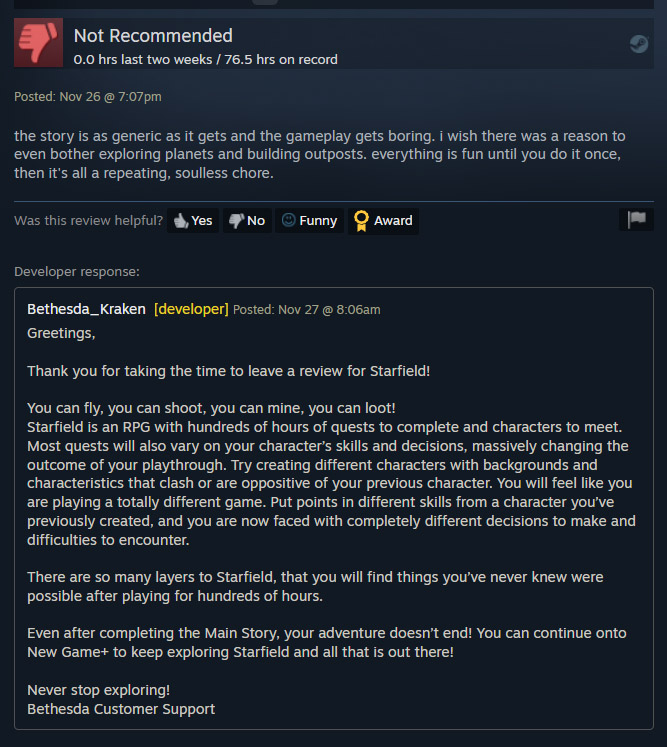On multiple occasions after publishing a review, I’ve had companies reach out to me to try and tell me why my opinions were wrong. I politely listen to their rebuttals, and then I don’t change the review, because hearing why a mouse button was put in a specific place doesn’t make me like it any better. Bethesda has decided to take the same tactic, except instead of rebutting professional reviewers, they’re arguing with PC gamers — their own, direct customers — in the Steam reviews for Starfield.
Social media account JuiceHead (via Eurogamer) spotted several negative reviews for Bethesda’s tentpole spacefaring RPG with replies made from verified Bethesda developer accounts, explaining why actually, the boring bits the reviewer was complaining about were very good. In response to a review complaining of a generic story and boring gameplay, from someone who’d spent more than three full days playing it, “Bethesda_Kraken” gave a rather boilerplate response:

Valve/Steam
Replying to a gamer who complained of loading times, another verified Bethesda account told them to “consider the amount of data for the expansive gameplay that is procedurally generated to load flawlessly in under 3 seconds.” Okay, thanks for the info Bethesda, but clearly those three seconds in rapid succession in an array of quick travel menus was something that this particular player didn’t enjoy.
Developers taking issue with particular gamers’ reviews isn’t exactly new, especially as Steam’s game reviews have become such an immediate arena for direct feedback. But it’s very rare to see a publisher like Bethesda engage in this kind of petty back-and-forth. I wonder if the recent discourse surrounding Starfield’s middling impact in such a big year for blockbuster games, like its absence on The Game Awards nominee list for Game of the Year or recent backslide into the “Mixed” reviews rating on Steam has energized the company’s public relations department.
It is, to put it mildly, a bad look. Arguing technical merits with someone who’s been paid to review your product is somewhat petty, especially if the opinions expressed don’t actually have anything to do with the specs. But going directly to the people who’ve paid you to play your game, and explaining why they should have enjoyed it more, is just going to annoy them.




